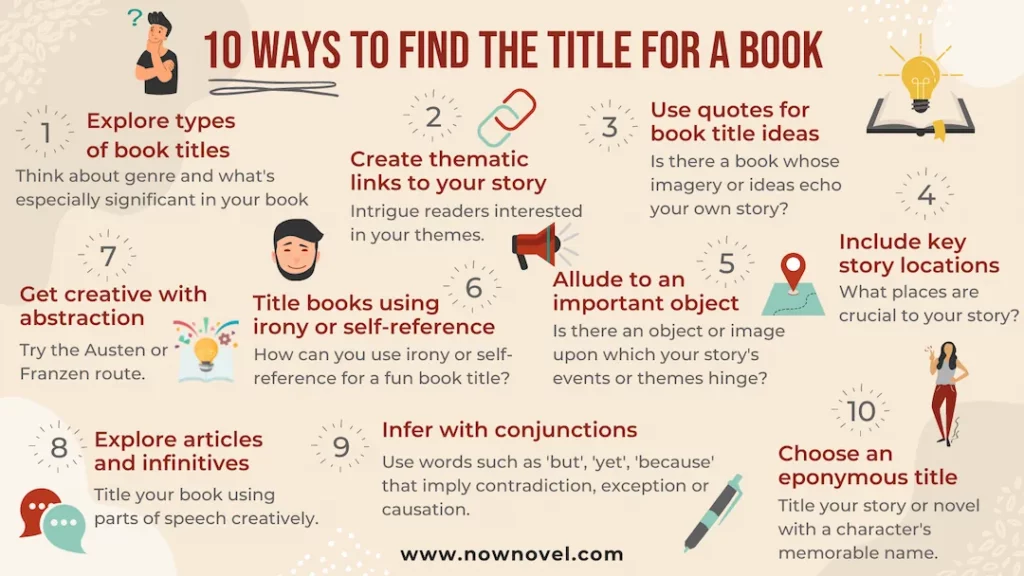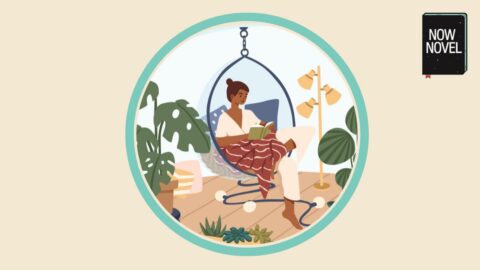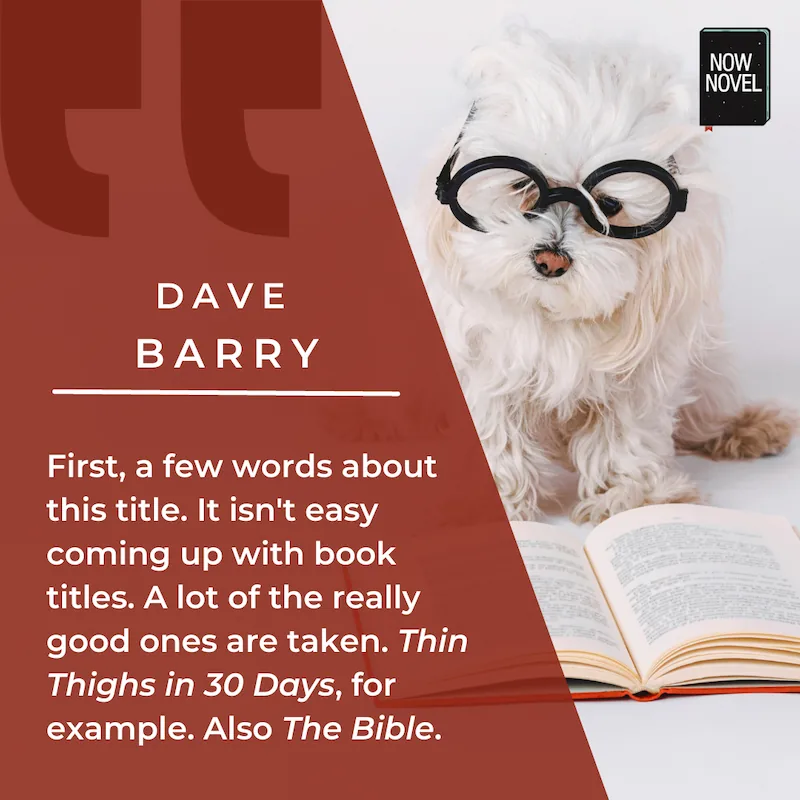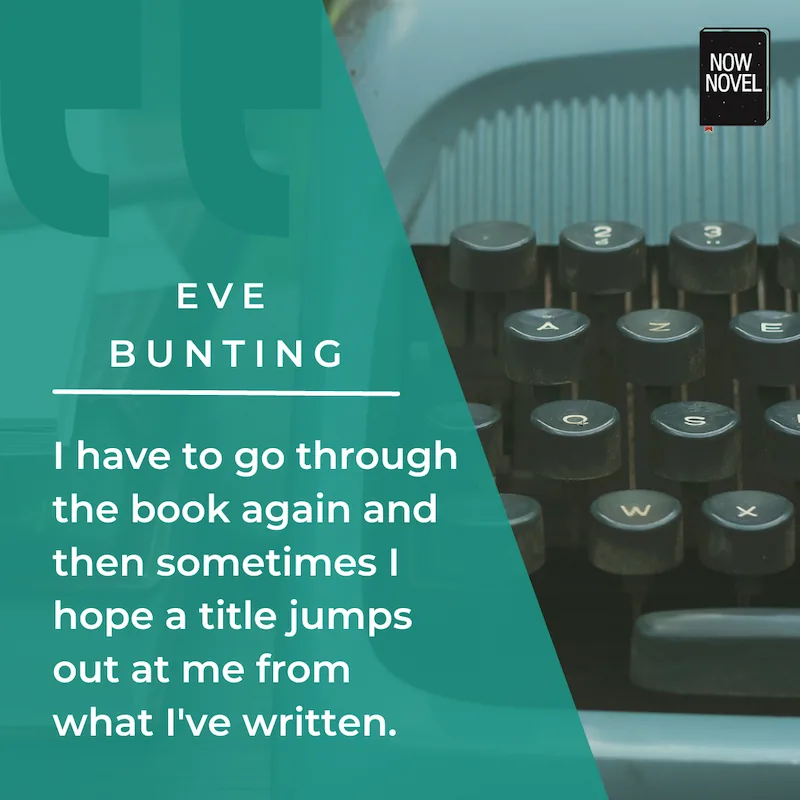Finding a title for a book or story that is apt, intriguing and evocative is challenging. Read ten ideas for how to come up with a book title, with examples from classics and contemporary bestsellers:
What types of book titles are common?
Before we explore ways to title stories, what are common types of title?
- Eponymous titles: Eponymous means a person gives their name to something. Book titles such as David Copperfield, Harry Potter or Jane Eyre are eponymous titles because the book is named after a central character (usually the protagonist).
- Action-based titles: These describe actions, e.g. The Spy who Came in from the Cold, To Kill a Mockingbird, One Flew Over the Cuckoo’s Nest.
- Place-based titles: Many novels’ titles refer to key story locations, e.g. A Room with a View, River of Smoke. Many combine place and action, e.g. Through the Looking Glass or To the Lighthouse.
- Quote-derived titles: Many authors quote other writers’ poems, novels and plays in titling their own fiction. A classic example of a quote-based title is William Faulkner’s The Sound and the Fury (which references Shakespeare’s Macbeth, the quote comparing life to ‘a tale/Told by an idiot, full of sound and fury/Signifying nothing’).
What are other types of book titles you’d add to the list above? Let us know in the comments, and keep reading for tips for titling your own book or story.
Need book title ideas? 10 ways to find them
Try these ideas on how to title a book (and comment how you chose the title for your last story).
- Explore types of book titles
Think about genre and what’s especially significant in your book (places, themes, characters) and brainstorm an evocative title.
- Create thematic links to your story
How can your book title evoke your story’s themes, mood and tone? What ideas or motifs will resonate with your story?
- Use quotes for book title ideas
Is there a book whose imagery or ideas echo your own story? A line from another story that captures the essence of your own?
- Include a key story location
What places are crucial to your story? Is there a place detail with relevance and resonance (e.g. Into the Wild)?
- Allude to an important object
Is there an object or image upon which your story’s events or themes hinge? (e.g. The Hungry Tide, The Purloined Letter).
- Title books using irony or self-reference
How can you use irony or self-reference for a fun book title? Keep reading for examples.
- Get creative with abstraction
Try the Austen or Franzen route and choose or combine abstract nouns that capture aspects of the story.
- Explore articles and infinitives
Title your book through creative use of parts of speech.
- Infer with conjunctions
Use words such as ‘but’, ‘yet’, ‘because’ that imply contradiction, exception or causation.
- Choose an eponymous title
Title your story or novel with a character’s memorable name (especially if your story is in an autobiographical style).
Let’s explore and expand on ways to choose titles for stories:
Explore types of book titles
The title of your novel isn’t everything. For your manuscript to be publishable it needs to:
- Have been edited by a professional
- Have a compelling story idea
- Have broad appeal in your genre or subject niche
- Have a cover comparable to similar titles that sell in your niche to appeal to readers of that genre
Even so, your title is the first thing most readers see, hear or read.
Great titles stand out. The best titles sell the story a little already, by stirring curiosity, emotion, and imagination.
Book titling exercise: Explore trending titles in your genre
Try a fun exercise to research titles among popular books in your genre and apply their insights to titling your own story:
- Go to a Goodreads or Amazon category page for your genre (for this example, we’ll use ‘contemporary romance’).
- Sort by top-rated/bestselling books descending in popularity.
- Write out a list of ten current, commercially or critically accomplished book titles.
- Examine these book titles for insights: How do they convey genre? What is intriguing about them? Do they imply any conflict or scenario?
Here are ten popular contemporary romance titles in 2022:
- It Starts with Us by Colleen Hoover
- Icebreaker by Hannah Grace
- Corrupted Chaos by Shain Rose
- It Ends with Us by Colleen Hoover
- The Wrong Bride by Catharina Maura
- King of Wrath by Ana Huang
- Until You Can’t by Brittney Sahin
- Runaway Groomsman by Meghan Quinn
- Things We Never Got Over by Lucy Score
- Arrogant Monster by Nicole Fox
Contemporary romance title insights
The above titles tell us:
- Contemporary romance book titles tend to be short – the longest in the list is Things We Never Got Over (24 characters)
- Titles often refer to relational concepts – brides, groomsmen, runaways, icebreakers – that make the intimate nature of stories in this genre clear
- Teasing story-specific conflicts, turning points or surprises may create intrigue (such as implying a groomsman runs away in Quinn’s title)

Get constructive writing feedback
Join a caring community and get feedback
on title ideas, story scenes and extra support when you upgrade.
Create thematic links to your story
You might be tempted to try a book title generator. Yet a tool cannot create the deeper thematic links to your story you can, knowing it well.
What are your story’s core themes?
As an example of an effective title, a Now Novel member titled his debut novel Whisky and Wildflowers, partly in homage to Austen (whose writing plays a part in the protagonist and his wife’s ‘meet cute’ told in flashback), and partly because these are two kinds of objects the protagonist associates deeply with his wife who dies of cancer early in the story.
Thematically, the objects connect to and suggest life’s fragility and ephemerality – wildflowers blooming briefly, whisky being consumable. Both take time to germinate or produce and are briefer to enjoy.
It’s an apt title for a story about a man’s journey towards seizing life and living it, despite deep grief.
Besides creating thematic resonance, how can you choose a title?
Use quotes for book title ideas
Many book title ideas are born from reading other writers. If an author’s work is in the public domain, it is safe to use a fragment or line for your title. Tread more carefully if the work is under copyright.
Many titles of classic stories and novels derive from famous quotations. For example:
- The Sound and the Fury by William Faulkner (Shakespeare’s Macbeth).
- For Whom the Bell Tolls by Ernest Hemingway (from John Donne’s famous meditation that begins ‘No man is an island’ – ‘any man’s death diminishes me, because I am involved in mankind, and therefore never send to know for whom the bell tolls; it tolls for thee’.
Authors in English in the public domain such as Charles Dickens have many wonderful lines that you could adapt for story titles (the way Faulkner adapts the Shakespeare quote from ‘a tale of sound and fury’ to the sound and the fury).
For example, from Dickens:
There was a steaming mist in all the hollows, and it had roamed in its forlornness up the hill, like an evil spirit, seeking rest and finding none. A clammy and intensely cold mist, it made its slow way through the air in ripples that visibly followed and overspread one another, as the waves of an unwholesome sea might do.
Charles Dickens, A Tale of Two Cities (1859), p. 38 (Penguin, 1980 edition)
Say you were writing a fantasy or mystery book involving a misty setting, you could try:
- The Mist in the Hollows
- The Restless Mist
- A Roaming Mist
- Spirits of the Mist
- The Unwholesome Sea
Title brainstorming exercise
Open a favorite book to a random page and write out a paragraph that catches your eye. Try to come up with book titles by linking words or imagery in this passage of text.
Include a key story location
Fantasy titles and thriller titles and other genres often mention important story locations in their titles.
An example: Evelyn Waugh’s post-war classic, Brideshead Revisited (1945). Brideshead is the name of a aristocratic manor belonging to a friend’s family the protagonist revisits as an army officer during World War II when it is a shell of its former splendor.
See the ways place features in a few bestselling fantasy and science fiction titles in 2022:
- The Witch’s Tree by Elena Collins
- Keeper of Enchanted Rooms by Charlie N. Holmberg
- Into a Cornish Wind by Kate Ryder
- The Ocean at the End of the Lane by Neil Gaiman
- A River Enchanted by Rebecca Ross
- The Hitchhiker’s Guide to the Galaxy by Douglas Adams
Whether cosmic (Adams’ classic, irreverent guide to the galaxy) or local (teasing a wonder at the end of an ordinary lane, in Gaiman’s example), place in these titles promises the adventure and enchantment you’d expect of fantastical fiction.
Allude to an important object
The title of a book is an opportunity to allude to what’s most interesting about a story.
Make your title convey to your reader what makes this story exceptional, mysterious, suspenseful, worth reading.
In choosing the title The Bluest Eye (1970) for her debut novel, Toni Morrison made a powerful statement, since her protagonist wishes she had blue eyes (a symbol with a loaded racial history). There’s the play on words in ‘blue’ in the sense of melancholia and sadness, since the story explores the foster system and abusive family dynamics.
The title of Barbara Kingsolver’s The Poisonwood Bible (1998) is excellent in how it alludes to the story’s themes and place all in one.
The title derives from a central character, a missionary in Central Africa, attempting to tell locals that Jesus is holy. Only he butchers the local language so that the locals hear that He ‘is poisonwood’ instead.
This unintentional mistranslation perfectly captures the themes of colonialism, the meeting and clash between cultures and ways. The title suggests another version of the Bible, out of context. It suggests the many lives texts have due to the ways they (and their meanings) travel and shift. And the violence narratives can do out of context or when shared with dubious or malicious intent.
What is an important object in your story that could provide title inspiration? Tell us in the comments.
Title books using irony or self-reference
Great book titles may also be fun, irreverent, ironic, or self-referential. They don’t only have to be serious or literary in title (even though they may be these things in content). Like a song that hides melancholic lyrics in a happy-sounding instrumental (and vice versa). There is room for play.
We recently spoke to literary agents Charlotte Colwill and Kay Peddle of Colwill & Peddle literary agency in a writing webinar. Peddle shared a forthcoming title she is proud of representing, titled Black Girl, No Magic by Kimberly McIntosh (due out 2023).
The blurb for the collection of essays asks the question, ‘In a complex world, who is allowed to be complicated? Who is entitled to a messy life full of triumphs, mistakes and tedium?’
It’s a clever book title questioning the idea of ‘platforming’ (only celebrating or promoting people who fit a narrow definition of desirability or achievement such as having so-called ‘black girl magic’).
It’s a title that creates space for the ordinary and unexceptional (and in doing so, is exceptional in a popular/public culture often obsessed with celebrating who achieves or does ‘the most’).
Another self-referentially ironic book title is Dave Eggers’ 2000 memoir, A Heartbreaking Work of Staggering Genius.
Book Riot has a list of funny titles.

Pay $0 for writing ideas
Get a weekly newsletter on writing craft packed with writing tips,
videos, news and fun writing polls.
Get creative with abstraction
What do Jane Austen and Jonathan Franzen have in common?
Book titles that use abstraction. Freedom. Purity. Sense and Sensibility. Pride and Prejudice. All the things people say others should have or shouldn’t.
Abstraction doesn’t always fit. Titling a doorstopper of a book Freedom (the novel is 152,000 words) makes more sense than if it had been a tiny novella.
A title such as Pride and Prejudice which combines abstractions has a little more resonance as it opens out possibilities of interpretation and possible questions. For example, ‘How are pride and prejudice related in the story? Or, ‘Who is prideful and who prejudicial? Does one quality lead to the other?’
Abstract titles exercise
Here’s an exercise to play with abstract nouns in choosing a book title:
- Choose an abstract noun (a noun defining a quality, state or idea rather than a concrete object, e.g. freedom, hope, peace, truth, wonder, surprise).
- Try to find three titles using that word.
Examples:
- The Wonder Years – a popular 1980s-1990s TV show about a kid coming of age in the 60s, starring Fred Savage.
- Surprise! Surprise! by Agatha Christie
- Losing Hope by Colleen Hoover

Explore articles and infinitives
Finding how to come up with a title can be a language game. Explore parts of speech and how you might fit them together in unexpected ways.
Two common building blocks of memorable book titles in English (and other languages that have these parts of speech) are articles and infinitives.
Story titles using articles
The definite article (‘the’) denotes a known or specified thing (for example, ‘the tree is brown’ refers to a specific, known tree). The indefinite article (‘a’) refers to a non-specified or general thing (for example ‘a tree is hard to climb’ is a general statement about trees).
This distinction is interesting in story titles. Take the horror classic A Nightmare on Elm Street. What if it was titled The Nightmare on Elm Street? Immediately we lose the sense of there being many nightmares, the sense of haziness that defines dreams themselves (and the unpredictability of the violent antagonist’s appearance). ‘A’ nightmare can unfold anytime. ‘The’ nightmare happens at a specific time.
‘The’ and ‘a’ have interesting inference in English. When we say ‘The Adventures of Augie March’ (the title of Saul Bellow’s novel about a man pursuing the American Dream), there’s a sense of it being the definitive account. ‘The’ is totemic, all-encompassing. The Road by Cormac McCarthy suggests one, defining road.
‘A’ by comparison conveys a sense not of the totemic and singular. An Education (the title of the coming-of-age film starring Carey Mulligan with a script by Nick Hornby) suggests education of one kind, out of possible other educations.
Play with the way articles suggest the known or unknown. Compare the effect in these made-up titles replacing one with the other:
- The Only Truth vs An Only Truth
- The Unnerving Proposal vs An Unnerving Proposal
- A Quiet Unbroken vs The Quiet Unbroken
Which of each story titles do you prefer, and why?
Story titles using infinitives
The infinitive (the verb form using ‘to’) suggests continuous action (the infinite or without end). Popular book titles that use this verb form include:
- To Kill a Mockingbird by Harper Lee
- To the Lighthouse by Virginia Woolf
- To Catch a Thief by David Dodge
- To Know a Woman by Amos Oz
Think of a core action or sentiment in your book. Try to brainstorm infinitive-using titles as an exercise.
Can you guess the actual titles of these books, turned into infinitive-based titles?
- To Destroy a Dangerous Ring
- To Be a Miser Among Spooks
- To Uncover Her Secret Wartime Past
- To Catch a Killer with Horrible Taste
Infer with conjunctions
Another way to come up with book titles is to use conjunctions (a word used to connect clauses or sentences such as ‘but’) to infer/suggest something.
Examples of book titles using conjunctions:
- But Beautiful by Geoff Dyer – a creative non-fiction celebration of jazz music (which borrows the title from a jazz standard written by Jimmy Van Heusen)
- Nowhere But Here by Katie McGarry – the first title in McGarry’s ‘Thunder Road’ YA series
- Because of Miss Bridgerton by Julia Quinn
- Because a Little Bug Went KA-CHOO! by Rosetta Stone (pseudonym of Dr. Seuss)
There are surely countless other ways to title a book using conjunctions. See how each of the titles infers something, creating mystery.
But Beautiful suggests a beauty in spite of some or other quality that would confer ugliness. Nowhere But Here could be read two ways – as meaning nowhere rather than here or nowhere existing except for here.
Because of Miss Bridgerton is succinct in rousing curiosity. It begs the question, what event or situation is due to Miss Bridgerton?
Because a Little Bug Went KA-CHOO! is fun and whimsical, calling to mind the cause-and-effect children’s songs such as ‘I Know an Old Woman’ that explore chain reactions or associations the way Dr. Seuss’s children’s books often do.
What could you infer as cause or exception using ‘because’ or ‘but’ in your title?
Choose an eponymous title
If you have a protagonist with a memorable name, or one who becomes a household name in your story (such as a famous actress, wizard, witch, punk rock star), an eponymous title may be an easy option.
This is a particularly common book title option for spin-offs. Think the long-running spin-off of Cheers, Frasier, which follows one of the characters from the original sitcom. Or the 2022 Netflix series, Wednesday, which follows the member of the Gothic Addams family.
Your book title could be just an eponym, or your protagonist’s name in a short phrase, or a combination of key characters’ names.
Some eponymous title examples:
- David Copperfield and Oliver Twist by Charles Dickens
- Emma by Jane Austen
- Daisy Jones & The Six by Taylor Jenkins Reid – about the rise of a 1970s rock group
- Grace & Frankie – the sitcom starring Jane Fonda and Lily Tomlin
- The Invisible life of Addie LaRue by V.E. Schwab
What’s the title of your WIP? Or what are some of your favorite titles ever? Share in the comments.
Get feedback on title ideas, synopses and story scenes when you join the Now Novel community, plus weekly feedback from an editor and live feedback sessions when you’re a premium member.
Now Novel has been invaluable in helping me learn about the craft of novel writing. The feedback has been encouraging, insightful and useful. I’m sure I wouldn’t have got as far as I have without the support of Jordan and the writers in the groups. Highly recommend to anyone seeking help, support or encouragement with their first or next novel. – Oliver





2 replies on “Book title ideas: How to come up with the best”
What are your thoughts on a running title for a book trilogy?
Hi Caleb – good question. It can be a good idea from a marketing perspective, as if each novel in the trilogy has a closely related name it will be easier for people who read and enjoyed one book to find the others. Try listing some trilogies that adopt this titling approach and make notes on how the titles are linked and what is effective about it for each trilogy. That should provide some inspiration.